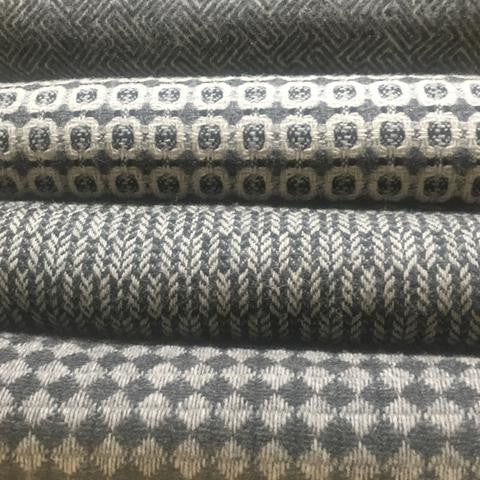When Neil suggested a break in Portugal my mind didn’t immediately turn to thoughts of woolly things although, unsurprisingly, it didn’t take me long to start investigating.
The history of Portuguese wool is rich with diverse breeds of sheep produced for meat, milk and fleece. However, as with the rest of Europe, the decline of wool production tracks the rise of alternative fibres, and the subsequent loss of it's financial value to the farmer. This has forced the diversification of fine wool flocks into mutton and milk production.
A view of the city from São Jorge Castle from its commanding position overlooking Lisbon.
In 2010 a group of people passionate about revitalising the cultural heritage of Portuguese wool established a project to renovate the spinning and weaving machinery to produce Burel. The wool is locally gathered from Bordaleira sheep, a breed capable of growing resistant, but still soft to the touch, fibres. The result is a tight, wear-resistant, natural fabric that is also water-repellent and fire retardant, without losing its flexibility. Burel was traditionally a very hard wearing fabric which had been spun and woven from the local sheep and then either boiled and compressed into an attractive, touch pliable fabric, or used as blankets and clothing.
The project looked at ways of bringing a contemporary feel into this ancient art. Through innovative design they have produced a range of outerwear of the most beautiful bags. Burel also now provide the felted fabric to architects and designers looking to utilise it's fantastic acoustic dampening properties.
The Burel shop located in Lisbon is cool and stylish and although I could of taken home many of the goodies on offer I opted for a back pack, as a girl never has enough bags.

A few of the Burel blanket designs.
The other treat to be held was Retrosaria a small shop, easily passed by on the Rue do Loreto 61. Through a rather tired doorway and up a steep stairway to the second floor we discovered a room full of beautiful things. From interesting Japanese pattern books to ribbon manufactured for the shop in Portugal. A worn table displayed many skeins of Portuguese yarn. All rather rustic, but beautiful and representative of the different sheep. The owner Rosa Pomar spends her time between the shop, where she teaches, and her field research of Portuguese textiles. Rosa has been crusading to bring back yarns produced in Portugal and has written a book , El Mundo de Pica Pau, which will be on my Christmas list as it is out in English later this year.
My goodies from Retrosaria.
Our next stop was the seaside town of Cascais, 40 minutes taxi ride further West than Lisbon it sits sheltered from the Atlantic. The streets are a mosaic of limestone and black basalt in beautifully intricate patterns, wide promenades play host to numerous cafes and small restaurants where fish is fresh from the local fishing boats.
Through one of my Instagram friends I was steered towards The Craft Company, away from the beach front it caught my eye immediately with a lovely shop front display. Inside the tiny shop was an array of haberdashery and knitting treats, covering the walls from floor to ceiling. Suffice to say I managed to buy some holiday goodies before departing.
For rest of the holiday, I ended up steering away from more fibre related retail therapy, giving me a chance to concentrate on my holiday knitting.
Portugal is a beautiful country with kind hospitable people and the most amazing food. Inspiration abounds due to the fantastic landscape and light and it will definitely be on the list for a return trip.






DSX3Nh3lhHwhnjB DSX3Nh3lhHwhnjB
Cheap hosting for just 10 bucks a year or VPS for just 6 bucks/mo.
url16.com/dnsklgyws
sUN1amZTKKjwqqT sUN1amZTKKjwqqT
Leave a comment